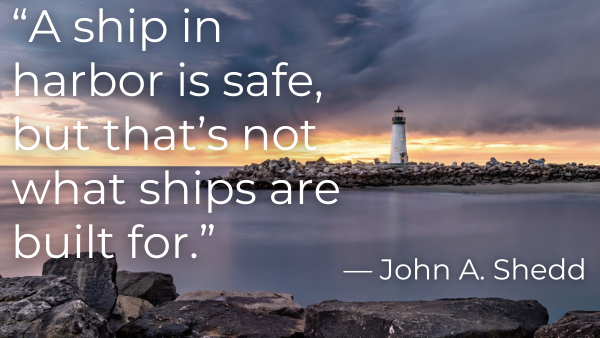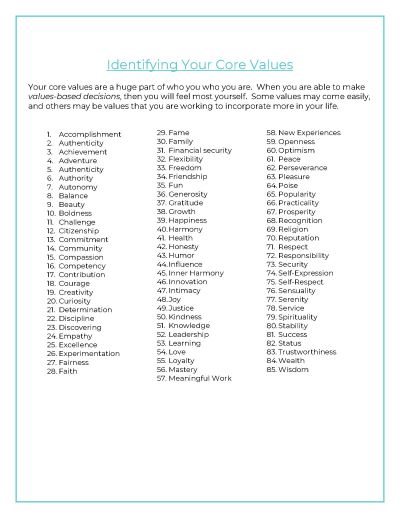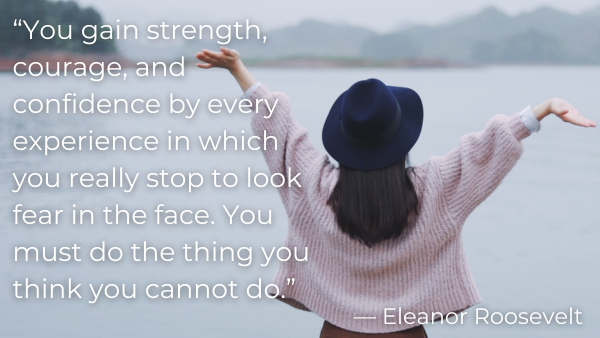Your friend comes up to you on your lunch break excited to tell you all about her upcoming birthday celebration. She talks about all the fun things she has planned and how much she hopes you can make it…along with all of her other friends that you don’t know.
You know that attending her celebration would mean a lot to your friend. And you really don’t have any other plans.
But just thinking about having to make small talk and interact with a whole group of people you don’t know, makes your stomach tie itself in knots and your palms sticky. The anxiety is kicking in.
And now you have a decision to make:
- Do you choose your friendship that you value and go to celebrate your friend’s birthday?
- Or do you make a choice based on how you are feeling in that moment, and make an excuse not to go?
This is a hard choice, and it would be highly understandable if you chose not to go. Maybe it’s just too much. Maybe you choose to celebrate your friend’s birthday in a different way by bringing her a cupcake that day.
Or maybe you’re tired of letting your fear make your decisions for you. Maybe you’re ready to start living your life the way that you choose, rather than the way that your anxiety wants you to.
This is where values-based decisions come in.
Table of Contents

What Are Fear-Based Decisions?
As humans, it is common for us to let our emotions make our decisions for us.
- “How come you did X thing?” “I felt like it.”
- Or: “How come you didn’t do X thing?” “I didn’t feel like it.”
This applies equally to our other emotions as well. For instance, we might act out of anger or hurt.
While our emotions are an essential part of our human experience, and can give us important information in many different situations, they are also not facts.
Feelings ≠ Facts
If you struggle with anxiety, then on many occasions your body will set off false alarms (i.e., “This is dangerous!”), even if there is no real danger. This can become problematic when we then start making all of our decisions based on this false alarm.
Small talk = Dangerous
Therefore, I shouldn’t go to my friend’s celebration.
Over time, the more we make decisions based on our fears, the more we miss out on things that we might enjoy or that might be important to us.
We let our fear rule our lives and “take the wheel.” Meanwhile, our world shrinks. Now let’s talk about the opposite of this: values-based decisions.
What Are Values-Based Decisions?
The alternative is to make your decisions based on your values, i.e., based on what’s important to you, and how you want to live your life, rather than how you feel in the moment.
In a way, we do this all the time. For example, most people don’t want to do their laundry. But they do want to be able to wear clean clothes. So, we do the thing we don’t really feel like doing anyway…at least eventually.
So, when you have a decision to make, and you’re not sure which direction to head, you can take a moment to identify:
| 1. How am I feeling about this? 2. What am I having the urge to do based on this feeling? 3. Which of my values are at play here? 4. What would I do based on my values (i.e., how I want to live my life)? 5. What do I ultimately want to do that would bring me more in line with my values (even if it’s just a small step)? |
In the case of the birthday celebration, you might recognize that you are feeling anxious and you are having the urge to avoid attending the celebration based on this feeling. You then acknowledge that friendship is one of your values, and so you decide to attend your friend’s birthday celebration, even if it’s just for a short time.
Identifying Your Core Values
In order to make values-based decisions, it can be helpful to take some time to identify what are your values. That is, what are your priorities in relation to your personal growth, your health, your work, your education, your relationships, your free time, etc.
There are many ways to accomplish this, but one way is this free Values Exercise that you can do in just a few minutes. Once you’re done, you can save your results to refer back to later.
You can also use the Values List below to print out and highlight the values that most resonate with you. You can start by highlighting all the values that are at least somewhat important to you in one color. Then come back and use a different color to highlight the most important 5 or 6.

Once you have your list of Core Values, you can use this to start guiding your decisions and making values-based decisions, rather than decisions based in fear.
How Your Values Can Guide Your Goals
While your most important values may be relatively stable over time, your most salient values will often shift. For example, while you are in school you may be leaning in to your value of learning, while later in life you may focus more on your value of making a contribution.
Once you have identified your current primary values, you can also create goals based on these values. For example, if you value knowledge, you may choose to dedicate time to learning about a topic that is interesting to you. Or if you value contribution, you may make it a goal to find a volunteer position.
There is an important difference between values and goals, however. A goal can be achieved. Once you have met your goal, you may decide to celebrate this accomplishment and possibly make a new goal. Or you may realize that you cannot meet this goal for one reason or another.
Values, however, are more of an overarching theme. And we can live out our values in many different ways. For example, if you value contribution, but you can’t find a volunteer position, you could choose to help your elderly neighbor around the house instead.
There are many different ways to live out our values, even if certain goals are unattainable.

Final Thoughts
While it is human to make our decisions based on how we are feeling in the moment, it can often bring us greater long-term satisfaction to make our choices based on what is important to us, i.e., our values.
That said, this is easier said than done. Be patient with yourself if you have gotten stuck in a cycle of fear and anxiety. Breaking out of this cycle and doing things differently can be extremely challenging and take time.
Just remember, baby steps will get you around the block.
As a reminder, this blog post is not intended as professional counseling or clinical advice. This article is meant to provide you with some helpful information about making values-based decisions so that fear isn’t running your life. If you are struggling with your mental health, I encourage you to consider reaching out for additional support, professional or otherwise.

– Kristel Roper, LMFT, LPCC
Kristel Roper is a licensed psychotherapist offering therapy services to individuals in the Sacramento area. She specializes in therapy for anxiety and OCD and especially enjoys working with young women as they navigate the challenges of relationships, college, career, and beyond. If you have a question for Kristel or are interested in therapy for yourself or your loved one, feel free to reach out.
Photo by Rodrigo Soares on Unsplash
